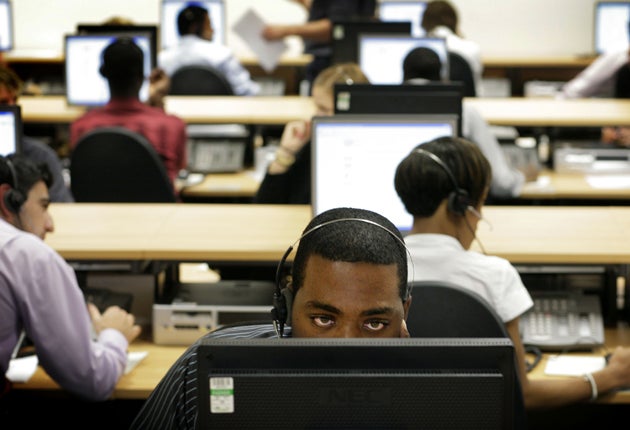I was a window cleaner – now I'm in a swine flu call centre
Case study

Your support helps us to tell the story
From reproductive rights to climate change to Big Tech, The Independent is on the ground when the story is developing. Whether it's investigating the financials of Elon Musk's pro-Trump PAC or producing our latest documentary, 'The A Word', which shines a light on the American women fighting for reproductive rights, we know how important it is to parse out the facts from the messaging.
At such a critical moment in US history, we need reporters on the ground. Your donation allows us to keep sending journalists to speak to both sides of the story.
The Independent is trusted by Americans across the entire political spectrum. And unlike many other quality news outlets, we choose not to lock Americans out of our reporting and analysis with paywalls. We believe quality journalism should be available to everyone, paid for by those who can afford it.
Your support makes all the difference.I found the job on a website, applied for it and got a call back within a couple of hours. It didn't seem to matter that I had no medical experience. Before I was made redundant I'd worked in many different jobs, including a stint as a window cleaner.
The guy was really just checking that I could hold a conversation over the phone. He gave me the job on the spot and sent me an email mentioning that training would start on Wednesday – the day before the hotline went live. I didn't hear anything else so turned up and between 8am and 4pm we were taken through what to do by someone from NHS Direct and the contractor.
There was quite a bit of confusion and there were a few problems with the paperwork and the website, but probably no more than you would expect for a start-up. One of the first issues we encountered on the job was that we could only help people in England – everyone from Wales, Scotland and Northern Ireland had to be directed elsewhere.
I must have taken one call every 20 minutes so there was some thumb-twiddling going on. But it was clear that the system was erring on the side of caution. Of the 40 people I spoke to on the first day, I recommended all but two should take anti-viral drugs.
It seemed to be all about dishing these things out. The procedure is so heavily scripted that you can end up asking silly questions. I heard one woman asked whether she was conscious when she rang up. We are also required to ask all women aged between 10 and 70 whether they could be pregnant, which can be embarrassing. People were asking things like: "These are strong drugs – are there any side-effects? What happens if I drive on them or have a couple of pints?" I advise them to read the packet.
There were also people ringing up from parts of the country where they have still not got any collection points for the drugs – places such as Oxfordshire, Buckinghamshire and Sheffield. We couldn't really help these people. I wonder how useful the hotline is.
People are ringing up thinking they are going to get a diagnosis but we only run through a checklist of the symptoms. They seem to think I'm the world's leading authority on this, but I tell them "I'm not a doctor".
During the training they were telling us what an important job we were doing allaying people's fears and potentially saving lives. I thought, if it is such an important job, shouldn't we get paid more than £6.60 an hour?
The writer did not wish to be identified
Join our commenting forum
Join thought-provoking conversations, follow other Independent readers and see their replies
Comments